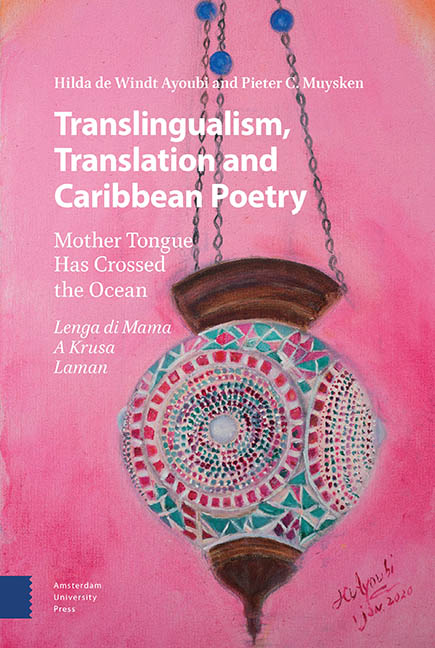Book contents
- Frontmatter
- Dedication
- Contents
- How to Navigate This Book: Kon Nabegá den e Buki akí
- Acknowledgements
- Preface
- Part 1 Introducing the Mother Tongue: Introdukshon di Lenga di Mama
- Part 2 The Poem “Lenga di Mama” and its Translations, Comments and Language Descriptions E Poema “Lenga di Mama” i su Tradukshonnan i Komentario i Deskripshon di e Idiomanan
- Part 3 The Poem “E ‘papiá’ di Papiamentu” and its Translations E Poema “E ‘papiá’ di Papiamentu” i su Tradukshonnan
- Part 4 The Poem “Papiamentu pa Semper” and its Translations E Poema “Papiamentu pa Semper” i su Tradukshonnan: The Translations and Editing of the Poem Hilda de Windt Ayoubi and Pieter Muysken (for Dutch)
- Part 5 The Poem “Riba Ala di Lenga di Mama” and its Translations E Poema “Riba Ala di Lenga di Mama” i su Tradukshonnan
- Part 6 Commentary: Komentario
- Note on the Authors: Informashon tokante e Outornan
- Index: Índise
Translation, Language Endangerment andRevitalization, Bilingual Texts: Tradukshon, Peligerpa Pèrdida di idioma i Revitalisashon di Idioma,Teksto Bilingual
Published online by Cambridge University Press: 15 September 2022
- Frontmatter
- Dedication
- Contents
- How to Navigate This Book: Kon Nabegá den e Buki akí
- Acknowledgements
- Preface
- Part 1 Introducing the Mother Tongue: Introdukshon di Lenga di Mama
- Part 2 The Poem “Lenga di Mama” and its Translations, Comments and Language Descriptions E Poema “Lenga di Mama” i su Tradukshonnan i Komentario i Deskripshon di e Idiomanan
- Part 3 The Poem “E ‘papiá’ di Papiamentu” and its Translations E Poema “E ‘papiá’ di Papiamentu” i su Tradukshonnan
- Part 4 The Poem “Papiamentu pa Semper” and its Translations E Poema “Papiamentu pa Semper” i su Tradukshonnan: The Translations and Editing of the Poem Hilda de Windt Ayoubi and Pieter Muysken (for Dutch)
- Part 5 The Poem “Riba Ala di Lenga di Mama” and its Translations E Poema “Riba Ala di Lenga di Mama” i su Tradukshonnan
- Part 6 Commentary: Komentario
- Note on the Authors: Informashon tokante e Outornan
- Index: Índise
Summary
Abstract
A sea of languages; we live in a world in whichthere are not just many languages but also manypeople who speak several. Linguists estimate thatthere are around 7,000 languages, but some arerapidly disappearing and sometimes the boundarybetween language and dialect is hard to establish.The figure 7,000 is thus somewhat arbitrary, butnot unreasonable. Yet many languages are underthreat, and language endangerment is an urgentcultural concern, since all languages are part ofthe intangible cultural heritage of mankind. Everylanguage is like a cathedral: the result ofcreative efforts of communities over thecenturies. This commentary on the translations ofHilda de Windt Ayoubi's poems deals withtranslations and their role in languagerevitalization. Can we cross that sea?
Keywords: Big languages, smalllanguages, language endangerment, languagerevitalization, bilingual, mass translations
I start with the processes of language loss andlanguage revitalization, as they relate totranslation, and illustrate this with a case studyon a dying language from Bolivia. In the third part,I also discuss the role of translation in a largersense, as something much broader than we tend tothink of it as, beyond a professional activity. Itfocuses on translation as enrichment and deals witha special kind of translations: those within asingle text and in bilingual songs. In bilingualcommunities, texts may contain translationfragments, doublings, in which potentiallycontrasting form and meaning elements in the twolanguages are juxtaposed, to celebrate thedifference, to create new meaning nuances, forenjoyment, for bilingual punning, etc. Here thetranslation is clearly a gain: both versions areavailable to the reader/hearer. I will illustratethis with examples from bilingual songs in theAndes, waynos,multilingual raps in the Berber community, andcalypsos from Trinidad.
The final part of the chapter deals with the largersocial ecology of translation practices and withmass translations. Most of the mass translationsinvolve a center-periphery model. Here, centraltexts such as the Gospel ofLuke, the UNDeclaration of Human Rights, or Le Petit Prince aretranslated into many languages. There is however asecond type of mass translation, as in this book. Atext from the periphery, in this case from theCreole language Papiamento, is translated into manydifferent languages, countering the trend towardsincreasing dominance by a single language.
- Type
- Chapter
- Information
- Translingualism, Translation and Caribbean PoetryMother Tongue Has Crossed the Ocean, pp. 275 - 292Publisher: Amsterdam University PressPrint publication year: 2022



